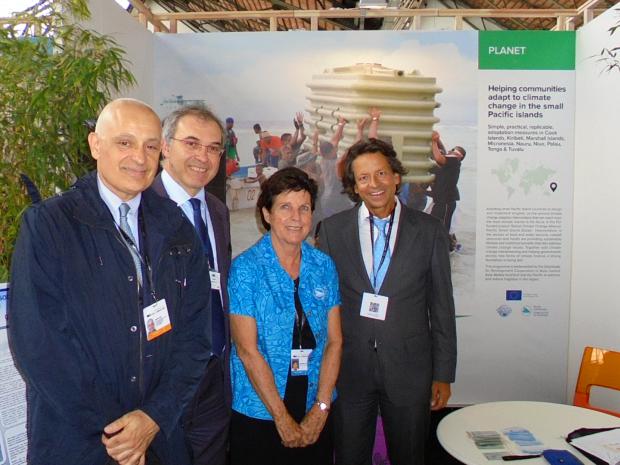SPC-GCCA-Pacific Small Island States project at European Development Days 2016
Discussion details

“Helping communities adapt to climate change in the small Pacific islands” was one of the display presentations at the EDD Village during the European Development Days that took place in Brussels on 15-16 June 2016 with 5,000 visitors from 140 countries and 1,200 organisations.
This display stand showcased the work of the Pacific Community’s (SPC) Global Climate Change Alliance: Pacific Small Islands States (GCCA: PSIS) project in nine countries: Cook Islands, Federated States of Micronesia (FSM), Kiribati, Marshall Islands, Nauru, Niue, Palau, Tonga and Tuvalu.
“The Directorate for Development Cooperation in Asia, Central Asia, Middle East/Gulf and the Pacific (DEVCO H) selected the GCCA: PSIS project from among 14 proposals from delegations and units worldwide as it was most relevant to the theme of addressing and reducing fragility in our regions” said Simone Ceramicola, Inter-Institutional Issues, DEVCO H.
Assisting small Pacific island countries design and implement tangible, on-the-ground climate change adaption interventions has been the focus of the EU-funded GCCA: PSIS project. These interventions in food and water security, coastal protection, health and marine resource sectors are providing sustainable lifestyle and livelihood benefits that also address climate change issues. Together with mainstreaming climate change into national and sector policies and helping equip governments to access new forms of climate finance, a strong foundation is being laid.
Among the five themes of EDD: People, Planet, Prosperity, Peace and Partnerships, the GCCA: PSIS stand focused on the Planet theme and in particular climate change. The display featured examples of simple, practical and replicable climate change adaptation measures that are relevant to small Pacific islands and in particular remote, outer island communities.
These included a display on solar disinfection (SODIS) which involves placing contaminated water in plastic bottles on a reflective surface in direct sunlight for 6 hours, after which the water is drinkable. This is reducing the rates of childhood diarrhoea in the demonstration community of Bairiki in Kiribati, and results in considerable cost savings for residents as they no longer have to boil water.
Another display featured first flush devices, which ensure the dirt that accumulates on household roofs does not contaminate household rainwater storage tanks, which in many outer islands are the only means of water storage.
Other climate change adaptation interventions in the Pacific were showcased through a series of lessons learnt videos which highlight a range of climate change adaptation interventions in the nine individual countries; these can also be viewed at: https://goo.gl/Prastx
Photo Caption: GCCA: PSIS stand at EDD with representatives of DEVCO H, left to right: Jean Barbe, Simone Ceramicola, and Jobst von Kirchmann (far right), with Gillian Cambers, Project Manager, GCCA: PSIS project (3rd from right).
Log in with your EU Login account to post or comment on the platform.